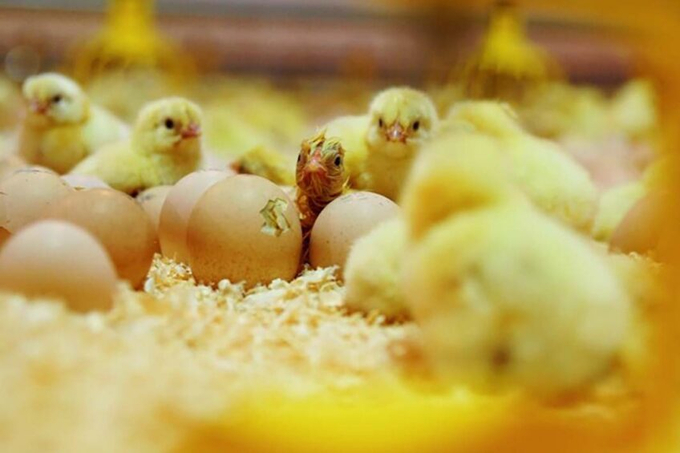May 27, 2025 | 11:10 GMT +7
May 27, 2025 | 11:10 GMT +7
Hotline: 0913.378.918
May 27, 2025 | 11:10 GMT +7
Hotline: 0913.378.918

NestBorn says that its on-farm hatching concept significantly improves the level of welfare and health of broilers, and that no investments or modifications are needed in the poultry house. Photo: NestBorn
European equipment companies, Vencomatic Group and NestBorn, recently entered the North American market. Vencomatic’s X-Treck system has trays placed on a rail system suspended from a range of heights to enable management of airflow and temperature. No walking of the barn to place eggs is required. NestBorn and One2born have trays placed directly on the barn floor. Some farmers also create their own systems.
There are 2 broiler farms in Canada using on-farm hatching systems (Vencomatic), one in New Brunswick and one in Quebec. However, that is expected to grow now that the Canadian Food Inspection Agency is no longer regulating every barn with on-farm hatching systems as a hatchery (which meant each barn needed a hatchery licence).
On-farm hatching is now regulated by the national broiler association, Chicken Farmers of Canada, through its Animal Care Program and On Farm Food Safety Program.
The cost of installing and managing on-farm hatching will be paid for over time in better production parameters. Giving newly-hatched chicks immediate access to feed and water, and sparing them the stress of transport from the hatchery, has been shown to result in better development of the digestive system and dryer manure, which helps prevent footpad lesions. There are also bird welfare benefits in immediate comfort through satiation.
The rate of return on investment also depends on other factors including hatching success rate, prior chick cost and distance from hatchery, as well as degree of automation.
At the same time on-farm hatching systems are starting to be used in Canada, the Canadian Hatching Egg Producers’ (CHEP) quality assurance program (CHEQ) is celebrating its 20th birthday this year.
Updates to the program include biosecurity clarifications, and changes related to water testing, medication usage and corrective action. The language has also been updated in some instances to reflect technology changes.
Meanwhile, it’s been 22 years since the Canadian Broiler Hatching Egg Producers’ Association (CBHEPA) first offered an annual program for young farmers (39 years of age or less).
The program gives producers the opportunity to tour primary breeder facilities in the US (Aviagen and Cobb) and learn more about the hatching egg industry and broiler breeder management.
However, starting this year, CBHEPA is collaborating with CHEP to offer a new professional development component to the Young Farmers Program, designed to help develop leadership skills.
(PW)

(VAN) Alt Carbon has raised $12 million in a seed round as it plans to scale its carbon dioxide removal work in the South Asian nation.

(VAN) Attempts to bring down the price of the Japanese staple have had little effect amid a cost-of-living crisis.

(VAN) Fourth most important food crop in peril as Latin America and Caribbean suffer from slow-onset climate disaster.

(VAN) Shifting market dynamics and the noise around new legislation has propelled Trouw Nutrition’s research around early life nutrition in poultry. Today, it continues to be a key area of research.

(VAN) India is concerned about its food security and the livelihoods of its farmers if more US food imports are allowed.

(VAN) FAO's Director-General emphasises the need to work together to transform agrifood systems.

(VAN) Europe is facing its worst outbreak of foot-and-mouth since the start of the century.